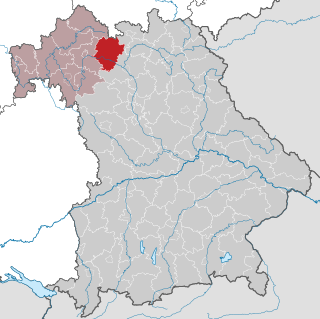The Christian Social Union in Bavaria is a Christian-democratic and conservative political party in Germany. The CSU operates only in Bavaria while its larger counterpart, the Christian Democratic Union (CDU), operates in the other fifteen states of Germany. It differs from the CDU by being somewhat more conservative in social matters. The CSU is considered an effective successor of the Weimar-era Catholic Bavarian People's Party (BVP).

The Free Democratic Party is a liberal and classical liberal political party in Germany. The FDP is led by Christian Lindner.

The Christian Democratic Union of Germany is a Christian democratic and liberal-conservative political party in Germany. It is the major catch-all party of the centre-right in German politics. The CDU forms the CDU/CSU grouping, also known as the Union, in the Bundestag with its Bavarian counterpart the Christian Social Union in Bavaria (CSU). The party is widely considered an effective successor of the Centre Party, although it has a broader base.

Federal elections were held in West Germany on 25 January 1987 to elect the members of the 11th Bundestag. This was the last federal election held in West Germany prior to German reunification.

Federal elections were held in West Germany on 6 March 1983 to elect the members of the 10th Bundestag. The CDU/CSU alliance led by Helmut Kohl remained the largest faction in parliament, with Kohl remaining Chancellor.

Federal elections were held in West Germany on 5 October 1980 to elect the members of the ninth Bundestag. Although the CDU/CSU remained the largest faction in parliament, Helmut Schmidt of the Social Democratic Party remained Chancellor.

Bad Königshofen im Grabfeld is a small spa town in the Rhön-Grabfeld district, in the north east of Lower Franconia, Bavaria, Germany on the Franconian Saale a few kilometers from the border with Thuringia. Several smaller villages exist within the town limits:

Federal elections were held in Germany on 18 September 2005 to elect the members of the 16th Bundestag. This became necessary after a motion of confidence in Chancellor Gerhard Schröder failed on 1 July. Following the defeat of Schröder's Social Democratic Party (SPD) in a state election, Schröder asked his supporters to abstain from the Bundestag motion, knowing the motion would fail and thus triggering an early federal election.

Stegaurach is a community in the Upper Franconian district of Bamberg and the seat of the administrative community (Verwaltungsgemeinschaft) of Stegaurach.

Kirchlauter is a municipality in the Bavarian Administrative Region of Lower Franconia in the district of Haßberge in Germany. It is a part of the Verwaltungsgemeinde of Ebelsbach.
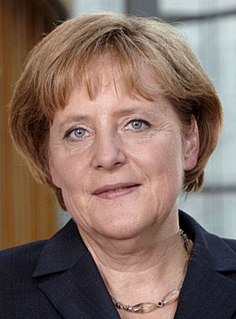
Federal elections took place on 27 September 2009 to elect the members of the 17th Bundestag (parliament) of Germany. Preliminary results showed that the Christian Democratic Union (CDU), its Bavarian sister party, the Christian Social Union (CSU), and the Free Democratic Party (FDP) won the election, and the three parties announced their intention to form a new centre-right government with Angela Merkel as Chancellor. Their main opponent, Frank-Walter Steinmeier's Social Democratic Party (SPD), conceded defeat. The Christian Democrats previously governed in coalition with the FDP in most of the 1949–1966 governments of Konrad Adenauer and Ludwig Erhard and the 1982–1998 governments of Helmut Kohl.
Merkel's first cabinet led the government of Germany from 22 November 2005 to 27 October 2009 throughout the 16th Bundestag. Led by Christian Democrat Angela Merkel, the first female chancellor in German history, the cabinet was supported by a grand coalition between the Christian Democratic Union (CDU), Christian Social Union of Bavaria (CSU), and the Social Democratic Party of Germany (SPD). It followed the Second Schröder cabinet. It ceased to function after the formation of Second Merkel cabinet, which was created after the 2009 federal elections, and was later sworn in on 28 October 2009.

Ebrach is a community with market rights in the Upper Franconian district of Bamberg and the seat of the Verwaltungsgemeinschaft of Ebrach.
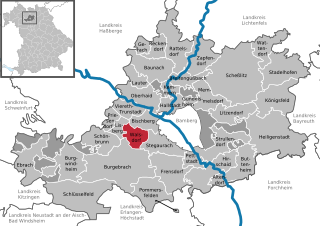
Walsdorf is a community in the Upper Franconian district of Bamberg and a member of the administrative community (Verwaltungsgemeinschaft) of Stegaurach. It lies in the valley of the Aurach roughly ten kilometres west of Bamberg.
CDU/CSU, unofficially the Union parties or the Union, is the centre-right Christian democratic political alliance of two political parties in Germany, namely the Christian Democratic Union of Germany (CDU) and Christian Social Union in Bavaria (CSU).
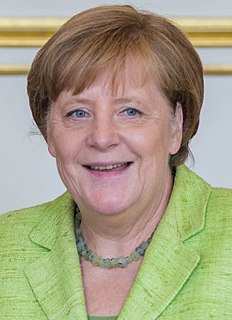
Federal elections were held in Germany on 24 September 2017 to elect the members of the 19th Bundestag. At stake were all 598 seats in the Bundestag, as well as 111 overhang and levelling seats determined thereafter.

The third cabinet of Federal Chancellor Angela Merkel was sworn in on 17 December 2013. Led by Merkel, the government was supported by a coalition of the Christian Democratic Union (CDU), the Christian Social Union of Bavaria (CSU), and the Social Democrats (SPD).
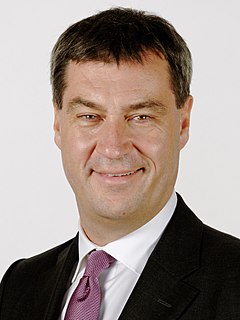
Markus Söder is a German politician and leader of the Christian Social Union (CSU) party since January 2019. He has served as Minister President of Bavaria since March 2018, leading the Cabinet Söder II.

Emilia Franziska Müller is a German chemical technician and politician. A member of the conservative Christian Social Union of Bavaria (CSU), she has served as a member of the Landtag and as Ministry of Labor and Social Affairs, Family and Integration in the 2nd Cabinet of Minister-President Horst Seehofer since 2013. She has held a wide range of public positions at the municipal, state, and European Parliamentary level since beginning her political career in 1990.

The fourth cabinet of Chancellor Angela Merkel is the current government of Germany, sworn in on 14 March 2018 after Merkel was proposed as Chancellor by President of Germany Frank-Walter Steinmeier and elected on the first ballot. It is the 24th cabinet of Germany.


